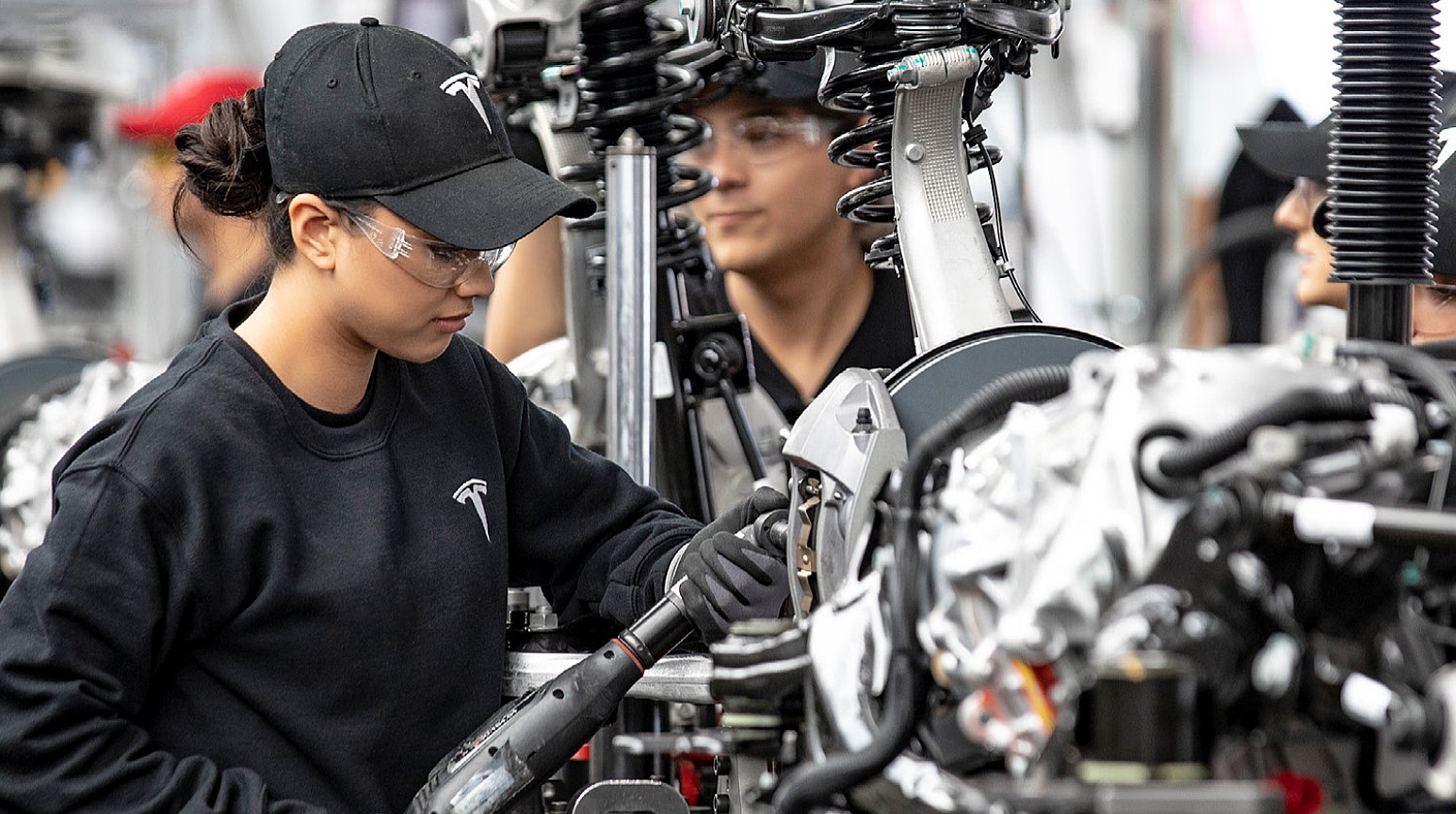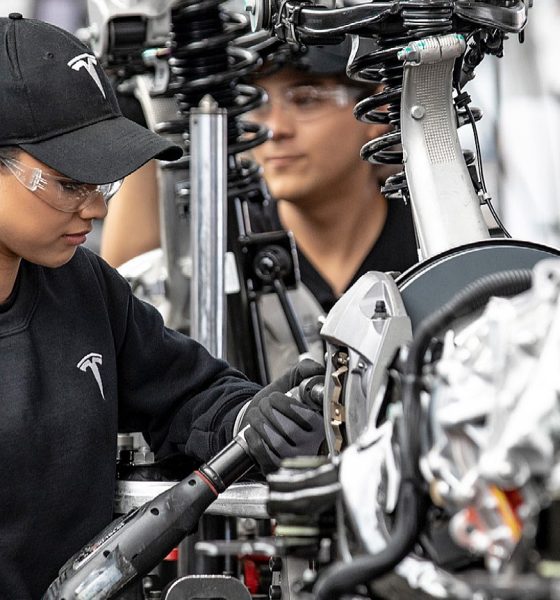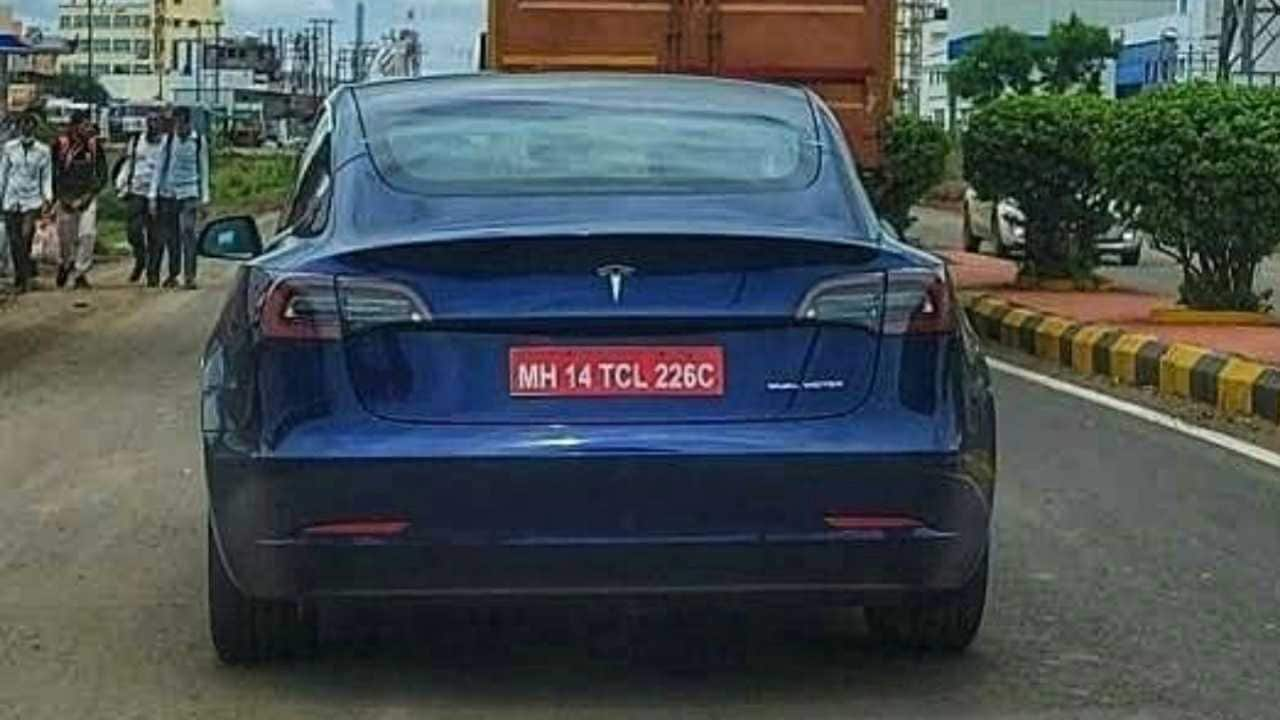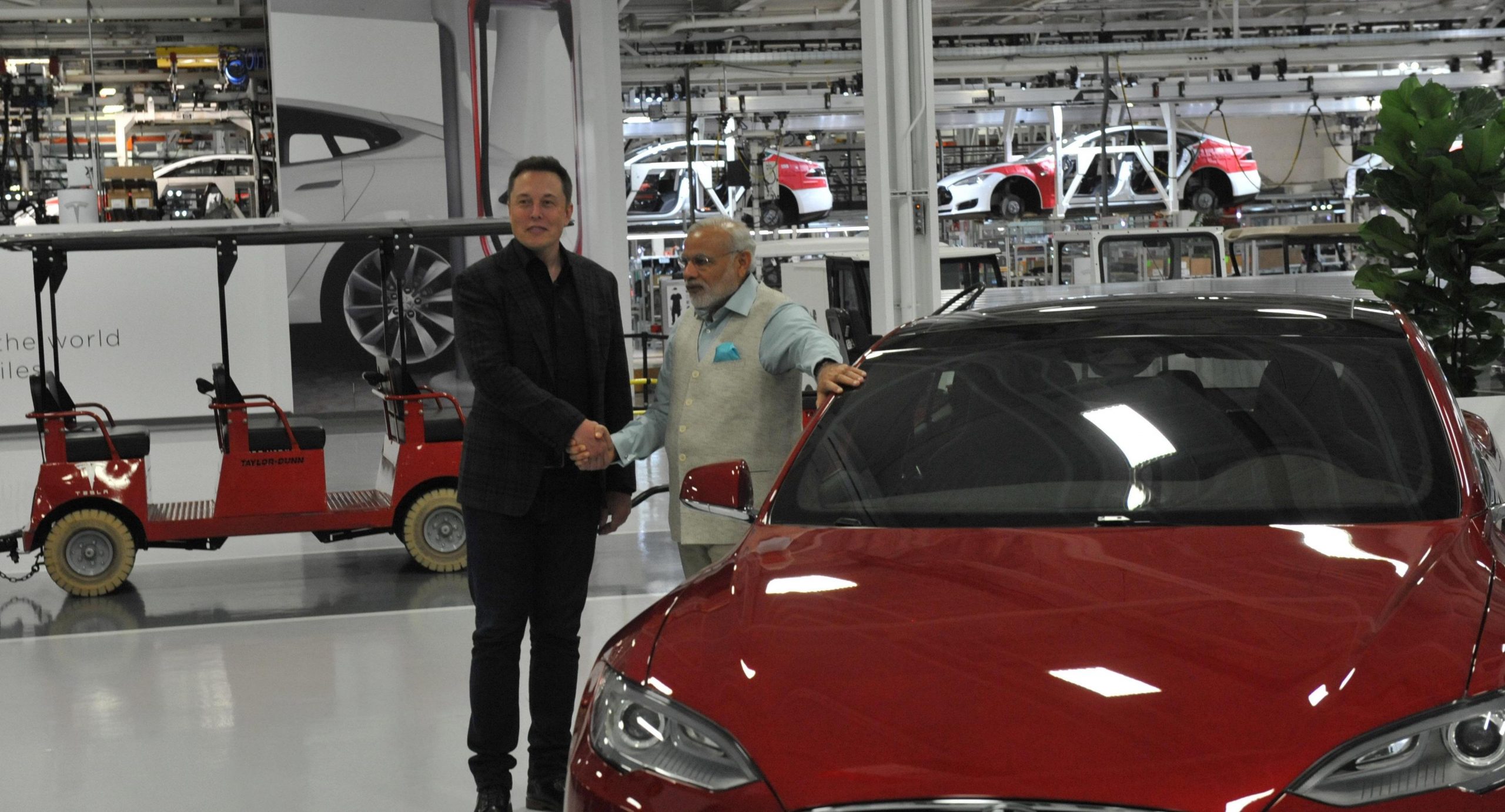

News
Tesla’s ‘challenges’ with India gov’t halt potential rescue of $27B manufacturing initiative
In 2014 when Narendra Modi officially became Prime Minister of India, his first message to people around the world was that, under his leadership, Indian manufacturing operations would become one of the world’s most robust. In September of the same year, Modi officially launched “Make In India,” a government initiative that encouraged companies from all corners of the globe to develop, produce, and assemble products in India with sizeable investments into manufacturing.
Five years after the initiative began, India’s manufacturing GDP was the lowest it had been in twenty years. It dropped 1.2% in the first five years following the launch of Make In India, although the growth rate of manufacturing globally increased 6.9% from 2014-15 to 2019-20.
Seven-and-a-half years later, Make In India is still a work in progress.
It was a disappointing start to the still active program, which has not been a complete failure. General Motors brought a $1 billion investment to a manufacturing facility in Maharashtra, the city where Tesla has been rumored to land with a potential factory of its own. Kia invested $1.1 billion in 2017 and has been producing vehicles at its factory in the Anantapur District since January 2019. Electrification, where the global automotive industry is heading, is still a weak point in India. Less than 1% of the country’s cars are electric.
Because of the extensive and massive $27 billion budget that has been set aside for these programs, India has tried to persuade companies to bring manufacturing to the country directly. With a sky-bound budget and thirst for local manufacturing, the confusion begins to set in: Why is Tesla, a company with a reputation for building the world’s best electric vehicles, that could likely build a manufacturing facility anywhere in the world, having so much trouble landing a deal in India to manufacture its vehicles?
A Tesla Model 3 testing in India (Credit: pune_exotics | Instagram)
The disconnect seems to be between Tesla’s requests and India’s needs. When Elon Musk, Tesla’s CEO, tweeted last night that there were still “challenges” when working with the Indian government, which had put the plans on hold once again, it seemed that the automaker’s requests for import duty reductions went to the wayside. An issue that seems to be Tesla’s most integral wish, import duty reduction has received support from some Indian politicians, noting that demand testing, which has been one key factor in the company’s attempts to enter India, cannot happen if duties are too high. “If they have to manufacture here, they need the numbers, and no one can test the market when you impose such high import duty on the vehicles,” Union Road Transport Minister Nitin Gadkari said in August.
If import taxation was not an issue, Tesla could use data already available to them to determine whether a Gigafactory would make sense in India. Spoiler alert: Tesla would never build a factory in India based on sales figures from the past ten years as very few people can afford them when import duties are involved. Any vehicle below $40,000 is subjected to 40% tax. Any vehicle more expensive than $40,000 receives a 100% tax, effectively doubling the price of the vehicle. Currently, Tesla has no vehicles in its lineup that are under the $40,000 price threshold.
The problem is those import duties are a huge issue. India seems to be against doing it, at least for now, even though the massive $27 billion budget would not be directly affected by an import tax rollback. In fact, that budget could still factor in tax losses from duty reductions. Perhaps the reasons linked to Tesla’s delayed entrance into India could be linked to the automaker’s lack of need for other companies due to its vertical integration. While this sounds far-fetched, the President of the Automotive Component Manufacturers Association (ACMA) said that localization is always a priority, and companies entering the market need to promote local manufacturing across the board, not just with the final product.
This would include everything from complex factors like semiconductors to other elements that are as simple as car seats. Tesla makes many of its parts in-house, including some microcontrollers and its automotive seats. “Tesla is absurdly vertically integrated compared to other auto companies or basically almost any company. We have a massive amount of internal manufacturing technology that we built ourselves,” Musk said in late 2020. “This makes it quite difficult to copy Tesla, which we’re not actually all that opposed to people copying us because you can’t do catalog engineering. You can’t just [say] I’ll pick up the supplier catalog, I’ll get one of those.”
This leaves India at a crossroads because, while Tesla would be a great benefit to the economy, manufacturing efforts, and employment, the company would not have as much to offer other sectors and companies as an automaker that is less vertically integrated. Reports have indicated that Tesla was planning to source components from local suppliers, but details regarding these rumors were slim.
India Prime Minister Narendra Modi visits the Tesla Fremont Factory in 2015.
But Tesla is far from a liability for any region. After launching Gigafactory Shanghai in China in early 2020, the factory has become Tesla’s biggest producer of EVs and accounted for nearly 52% of the automaker’s total deliveries for 2021. Despite the company’s vertical integration, which has increased gross margin on some Made-in-China Tesla vehicles to nearly 40%, the company has provided China with many economic benefits. The site will soon employ 9,000 people on the Model Y line alone after a confirmed expansion found in Tesla’s Environmental Impact Assessment for 2021. Gigafactory Shanghai will have 18,000 employees by the time the line expansion is completed. Additionally, it has helped encourage the adoption of EVs in Europe through exports, making the Model 3 the best-selling EV on the continent in 2021, with over 109,670 units sold. The next closest was the Renault Zoe, with 58,242 sales.
Whether Tesla will ever enter India seems to be a question that has no definitive answer currently. However, Tesla has been teasing a potential entrance for seven years, ever since Modi visited the Fremont factory in 2015. The long saga of Tesla and India will continue for now. With Tesla’s attractive status as an EV powerhouse, other countries might come knocking on the door, stealing an opportunity to increase India’s slumping reputation as a manufacturing hub. Considering the Made In India initiative’s backtrack in manufacturing GDP, perhaps new strategies should be tested.
I’d love to hear from you! If you have any comments, concerns, or questions, please email me at joey@teslarati.com. You can also reach me on Twitter @KlenderJoey, or if you have news tips, you can email us at tips@teslarati.com.

News
Tesla wins another award critics will absolutely despise
Tesla earned an overall score of 49 percent, up 6 percentage points from the previous year, widening its lead over second-place Ford (45 percent, up 2 points) to a commanding 4-percentage-point gap. The company also excelled in the Fossil Free & Environment category with a 50 percent score, reflecting strong progress in reducing emissions and decarbonizing operations.

Tesla just won another award that critics will absolutely despise, as it has been recognized once again as the company with the most sustainable supply chain.
Tesla has once again proven its critics wrong, securing the number one spot on the 2026 Lead the Charge Auto Supply Chain Leaderboard for the second consecutive year, Lead the Charge rankings show.
NEWS: Tesla ranked 1st on supply chain sustainability in the 2026 Lead the Charge auto/EV supply chain scorecard.
“@Tesla remains the top performing automaker of the Leaderboard for the second year running, and increased its overall score by 6 percentage points, while Ford only… pic.twitter.com/nAgGOIrGFS
— Sawyer Merritt (@SawyerMerritt) March 4, 2026
This independent ranking, produced by a coalition of environmental, human rights, and investor groups including the Sierra Club, Transport & Environment, and others, evaluates 18 major automakers on their efforts to build equitable, sustainable, and fossil-free supply chains for electric vehicles.
Tesla earned an overall score of 49 percent, up 6 percentage points from the previous year, widening its lead over second-place Ford (45 percent, up 2 points) to a commanding 4-percentage-point gap. The company also excelled in the Fossil Free & Environment category with a 50 percent score, reflecting strong progress in reducing emissions and decarbonizing operations.
Perhaps the most impressive achievement came in the batteries subsection, where Tesla posted a massive +20-point jump to reach 51 percent, becoming the first automaker ever to surpass 50 percent in this critical area.
Tesla achieved this milestone through transparency, fully disclosing Scope 3 emissions breakdowns for battery cell production and key materials like lithium, nickel, cobalt, and graphite.
The company also requires suppliers to conduct due diligence aligned with OECD guidelines on responsible sourcing, which it has mentioned in past Impact Reports.
While Tesla leads comfortably in climate and environmental performance, it scores 48 percent in human rights and responsible sourcing, slightly behind Ford’s 49 percent.
The company made notable gains in workers’ rights remedies, but has room to improve on issues like Indigenous Peoples’ rights.
Overall, the leaderboard highlights that a core group of leaders, Tesla, Ford, Volvo, Mercedes, and Volkswagen, are advancing twice as fast as their peers, proving that cleaner, more ethical EV supply chains are not just possible but already underway.
For Tesla detractors who claim EVs aren’t truly green or that the company cuts corners, this recognition from sustainability-focused NGOs delivers a powerful rebuttal.
Tesla’s vertical integration, direct supplier contracts, low-carbon material agreements (like its North American aluminum deal with emissions under 2kg CO₂e per kg), and raw materials reporting continue to set the industry standard.
As the world races toward electrification, Tesla isn’t just building cars; it’s building a more responsible future.
News
Tesla Full Self-Driving likely to expand to yet another Asian country
“We are aiming for implementation in 2026. [We are] doing everything in our power [to achieve this],” Richi Hashimoto, president of Tesla’s Japanese subsidiary, said.

Tesla Full Self-Driving is likely to expand to yet another Asian country, as one country seems primed for the suite to head to it for the first time.
The launch of Full Self-Driving in yet another country this year would be a major breakthrough for Tesla as it continues to expand the driver-assistance program across the world. Bureaucratic red tape has held up a lot of its efforts, but things are looking up in some regions.
Tesla is poised to transform Japan’s roads with Full Self-Driving (FSD) technology by 2026.
Richi Hashimoto, president of Tesla’s Japanese subsidiary, announced the ambitious timeline, building on successful employee test drives that began in 2025 and earned positive media reviews. Test drives, initially limited to the Model 3 since August 2025, expanded to the Model Y on March 5.
Once regulators approve, Over-the-Air (OTA) software updates could activate FSD across roughly 40,000 Teslas already on Japanese roads. Japan’s orderly traffic and strict safety culture make it an ideal testing ground for autonomous driving.
Hashimoto said:
“We are aiming for implementation in 2026. [We are] doing everything in our power [to achieve this].”
The push aligns with Hashimoto’s leadership, which has been credited for Tesla’s sales turnaround.
In 2025, Tesla delivered a record 10,600 vehicles in Japan — a nearly 90% jump from the prior year and the first time exceeding 10,000 units annually.
BREAKING 🇯🇵 FSD IS LIKELY LAUNCHING IN JAPAN IN 2026 🚨
Richi Hashimoto, President of Tesla’s Japanese subsidiary, stated: “We are aiming for implementation in 2026” and added that they are “doing everything in our power” to achieve this 🔥
Test drives in Japan began in August… pic.twitter.com/jkkrJLszXN
— Ming (@tslaming) March 5, 2026
The strategy shifted from online-only sales to adding 29 physical showrooms in high-traffic malls, plus staff training and attractive financing offers launched in January 2026. Tesla also plans to expand its Supercharger network to over 1,000 points by 2027, boosting accessibility.
This Japanese momentum reflects Tesla’s broader international expansion. In Europe, Giga Berlin produced more than 200,000 vehicles in 2025 despite a temporary halt, supplying over 30 markets with plans for sequential production growth in 2026 and battery cell manufacturing by 2027.
While regional EV sales faced headwinds, the factory remains a cornerstone for Model Y deliveries across the continent.
In Asia, Giga Shanghai continues to be recognized as Tesla’s powerhouse. China, the company’s largest market, saw January 2026 deliveries from the plant rise 9 percent year-over-year to 69,129 units, with affordable new models expected later this year.
FSD advancements, already progressing in the U.S. and South Korea, are slated for Europe and further Asian rollout, complementing plans to expand Cybercab and Optimus to new markets as well.
With OTA-enabled autonomy on the horizon and retail strategies paying dividends, Tesla is strengthening its footprint from Tokyo showrooms to Berlin assembly lines and Shanghai exports. As Hashimoto continues to push Tesla forward in Japan, the company’s global vision for sustainable, self-driving mobility gains traction across Europe and Asia.
News
Tesla ships out update that brings massive change to two big features
“This change only updates the name of certain features and text in your vehicle,” the company wrote in Release Notes for the update, “and does not change the way your features behave.”

Tesla has shipped out an update for its vehicles that was caused specifically by a California lawsuit that threatened the company’s ability to sell cars because of how it named its driver assistance suite.
Tesla shipped out Software Update 2026.2.9 starting last week; we received it already, and it only brings a few minor changes, mostly related to how things are referenced.
“This change only updates the name of certain features and text in your vehicle,” the company wrote in Release Notes for the update, “and does not change the way your features behave.”
The following changes came to Tesla vehicles in the update:
- Navigate on Autopilot has now been renamed to Navigate on Autosteer
- FSD Computer has been renamed to AI Computer
Tesla faced a 30-day sales suspension in California after the state’s Department of Motor Vehicles stated the company had to come into compliance regarding the marketing of its automated driving features.
The agency confirmed on February 18 that it had taken a “corrective action” to resolve the issue. That corrective action was renaming certain parts of its ADAS.
Tesla discontinued its standalone Autopilot offering in January and ramped up the marketing of Full Self-Driving Supervised. Tesla had said on X that the issue with naming “was a ‘consumer protection’ order about the use of the term ‘Autopilot’ in a case where not one single customer came forward to say there’s a problem.”
This was a “consumer protection” order about the use of the term “Autopilot” in a case where not one single customer came forward to say there’s a problem.
Sales in California will continue uninterrupted.
— Tesla North America (@tesla_na) December 17, 2025
It is now compliant with the wishes of the California DMV, and we’re all dealing with it now.
This was the first primary dispute over the terminology of Full Self-Driving, but it has undergone some scrutiny at the federal level, as some government officials have claimed the suite has “deceptive” names. Previous Transportation Secretary Pete Buttigieg was one of those federal-level employees who had an issue with the names “Autopilot” and “Full Self-Driving.”
Tesla sued the California DMV over the ruling last week.








